新人教版七年级英语下册第四单元导学案教学提纲
- 格式:doc
- 大小:39.50 KB
- 文档页数:10
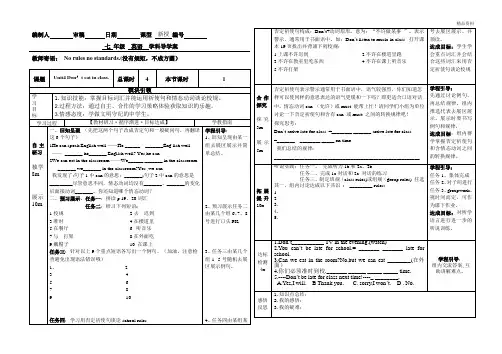
精品资料编制人审稿日期课型新授编号七年级英语学科导学案教师寄语:No rules no standards.(没有规矩,不成方圆)课题Unit4 Don’t eat in class.总课时 4 本节课时 1模块引领学习目标1.知识技能:掌握目标词汇并能运用祈使句和情态动词谈论校规。
2.过程方法:通过自主、合作的学习策略体验获取知识的乐趣。
3.情感态度:学做文明守纪的中学生。
学习过程【教材研习·循序渐进·目标达成】学教指南自主研习独学8m展示10m 一、旧知呈现(先把这两个句子改成否定句和一般疑问句,再翻译这6个句子)1He can speak English well.——He ______ _______Eng lish well.——_______ he_______ English well? Yes,he can2We can eat in the classroom.——We______ _______ in the classroom.-----_______ we_______ in the classroom?Yes ,we can.我发现了:句子1中can的意思:_______;句子2中can的意思是_________尽管意思不同,情态动词均没有_______、_______的变化后面接动词_______。
你还知道哪个情态动词?二、预习展示。
任务一:拼读p.19、20词汇任务二:研习下列短语;1.校规2.去....迟到3.准时4.在楼道里5.在餐厅6. 听音乐7.与....打架8.在外面吃9.戴帽子10 在课上任务三:针对以上9个重点短语各写出一个例句。
(加油,注意检查避免出现语法错误哦)1、 23 45 67 89 10任务四:学习用否定祈使句谈论school rules.学程引导:1、旧知呈现由某一组去展区展示并简单总结。
2、预习展示任务二由某几个组6、7、8号进行口头PK.3、任务三由某几个组1--5号随机去展区展示例句。
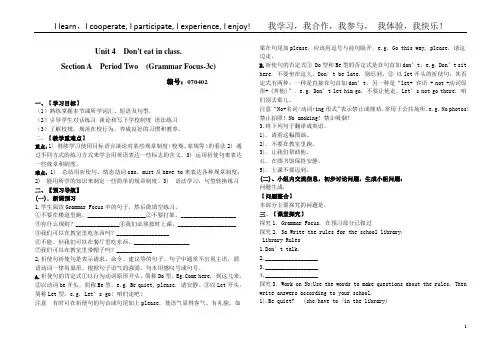
Unit 4 Don't eat in class.Section A Period Two (Grammar Focus-3c)编号:070402一、【学习目标】(1)熟练掌握本节课所学词汇、短语及句型。
(2)引导学生对话练习谈论和写下学校制度语法练习(3)了解校规,规范在校行为,养成良好的习惯和教养。
二、【教学重难点】重点:1) 继续学习使用目标语言谈论对某些规章制度(校规、家规等)的看法2) 通过不同方式的练习方式来学会用英语表达一些标志的含义。
3) 运用祈使句来表达一些规章和制度。
难点:1) 总结用祈使句、情态动词can、must及have to来表达各种规章制度;2) 能用所学的知识来制定一些简单的规章制度。
3) 语法学习,句型转换练习二、【预习导航】(一).新课预习1.学生阅读Grammar Focus中的句子,然后做填空练习。
①不要在楼道里跑。
____________________②不要打架。
___________________ ③有什么规则?_______________④我们必须按时上课。
____________________⑤我们可以在教室里吃东西吗?__________________⑥不能。
但我们可以在餐厅里吃东西。
___________________⑦我们可以在教室里带帽子吗?____________2.祈使句祈使句是表示请求、命令、建议等的句子。
句子中通常不出现主语,谓语动词一律用原形。
根据句子语气的强弱,句末用感叹号或句号。
A.祈使句的肯定式①以行为动词原形开头,简称Do型。
e here. 到这儿来。
②以动词be开头,简称Be型。
e.g. Be quiet, please. 请安静。
③以Let开头,简称Let型。
e.g. Let’s go! 咱们走吧!注意有时可在祈使句的句首或句尾加上please,使语气显得客气、有礼貌。
如果在句尾加please,应该用逗号与前句隔开。
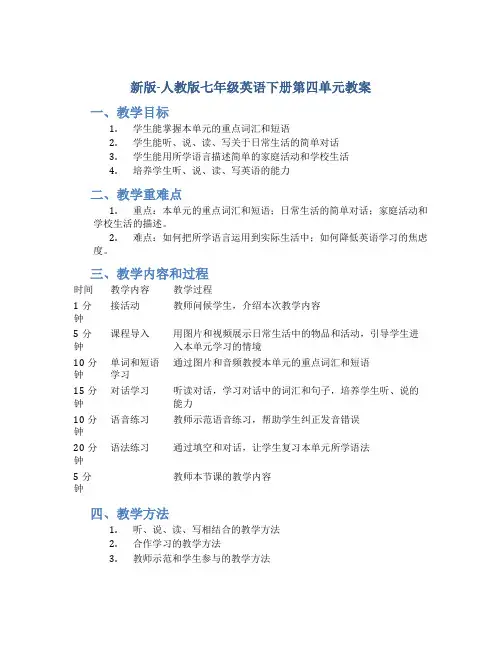
新版-人教版七年级英语下册第四单元教案一、教学目标1.学生能掌握本单元的重点词汇和短语2.学生能听、说、读、写关于日常生活的简单对话3.学生能用所学语言描述简单的家庭活动和学校生活4.培养学生听、说、读、写英语的能力二、教学重难点1.重点:本单元的重点词汇和短语;日常生活的简单对话;家庭活动和学校生活的描述。
2.难点:如何把所学语言运用到实际生活中;如何降低英语学习的焦虑度。
三、教学内容和过程时间教学内容教学过程1分钟接活动教师问候学生,介绍本次教学内容5分钟课程导入用图片和视频展示日常生活中的物品和活动,引导学生进入本单元学习的情境10分钟单词和短语学习通过图片和音频教授本单元的重点词汇和短语15分钟对话学习听读对话,学习对话中的词汇和句子,培养学生听、说的能力10分钟语音练习教师示范语音练习,帮助学生纠正发音错误20分钟语法练习通过填空和对话,让学生复习本单元所学语法5分钟教师本节课的教学内容四、教学方法1.听、说、读、写相结合的教学方法2.合作学习的教学方法3.教师示范和学生参与的教学方法五、教学评价1.用评分表记录学生的听力、口语、阅读、写作能力2.通过课堂练习和作业评价学生的掌握程度3.通过学生的成绩单和家长反馈评价本次教学效果六、教学资源和评估方法1.教学资源:电子白板、投影、PPT、音频文件、教学评分表2.教学评估方法:课堂练习、作业、考试成绩、学生评价、家长反馈七、课堂延伸1.建议学生自己编写一些简单的日常对话,加深对本单元所学内容的理解和运用2.鼓励学生自学资源,如通过网站或应用程序练习语音和听力技能。
八、教学反思1.通过评估学生表现,教师可以了解到学生在哪些方面仍需加强练习和学习。
2.对课堂延伸给予具体的建议,扩展学生对英语学习的兴趣和深度。
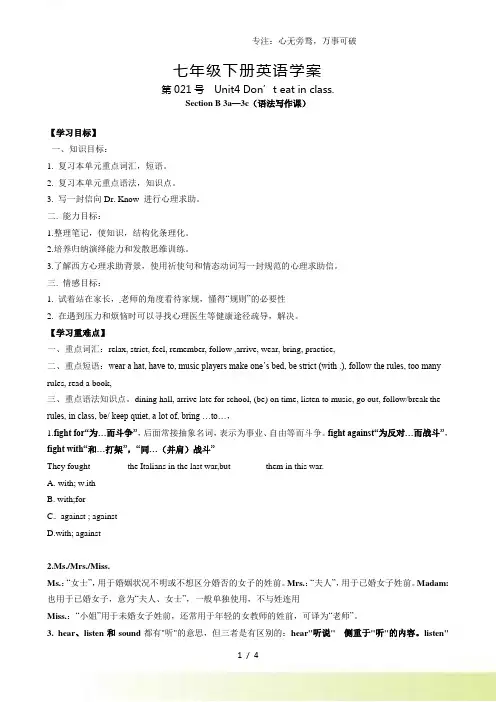
七年级下册英语学案第021号Unit4 Don’t eat in class.Section B 3a—3c(语法写作课)【学习目标】一、知识目标:1. 复习本单元重点词汇,短语。
2. 复习本单元重点语法,知识点。
3. 写一封信向Dr. Know 进行心理求助。
二. 能力目标:1.整理笔记,使知识,结构化条理化。
2.培养归纳演绎能力和发散思维训练。
3.了解西方心理求助背景,使用祈使句和情态动词写一封规范的心理求助信。
三. 情感目标:1. 试着站在家长,老师的角度看待家规,懂得“规则”的必要性2. 在遇到压力和烦恼时可以寻找心理医生等健康途径疏导,解决。
【学习重难点】一、重点词汇:relax, strict, feel, remember, follow ,arrive, wear, bring, practice,二、重点短语:wear a hat, have to, music players make one’s bed, be strict (with .), follow the rules, too many rules, read a book,三、重点语法知识点。
dining hall, arrive late for school, (be) on time, listen to music, go out, follow/break the rules, in class, be/ keep quiet, a lot of, bring …to…,1.fight for“为…而斗争”,后面常接抽象名词,表示为事业、自由等而斗争。
fight against“为反对…而战斗”,fight with“和…打架”,“同…(并肩)战斗”They fought ________the Italians in the last war,but________them in this war.A.with; w ithB. with;forC.against ; againstD.with; against2.Ms./Mrs./Miss.Ms.:“女士”,用于婚姻状况不明或不想区分婚否的女子的姓前。
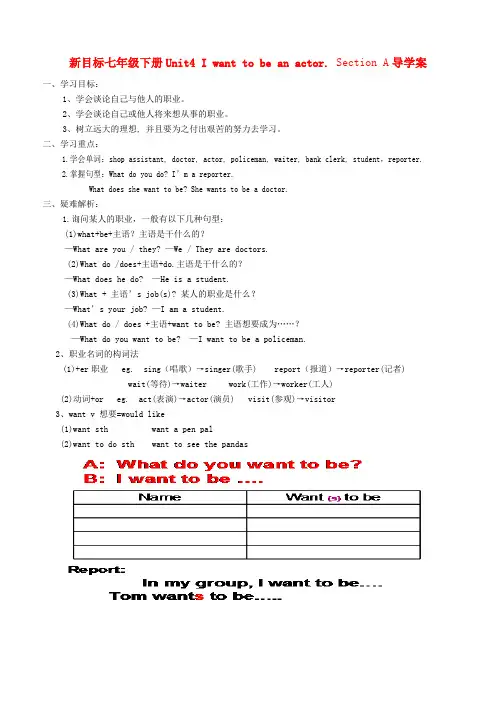
新目标七年级下册Unit4 I want to be an actor. Section A导学案一、学习目标:1、学会谈论自己与他人的职业。
2、学会谈论自己或他人将来想从事的职业。
3、树立远大的理想, 并且要为之付出艰苦的努力去学习。
二、学习重点:1.学会单词:shop assistant, doctor, actor, policeman, waiter, bank clerk, student,reporter.2.掌握句型:What do you do? I’m a reporter.What does she want to be? She wants to be a doctor.三、疑难解析:1.询问某人的职业,一般有以下几种句型:(1)what+be+主语?主语是干什么的?—What are you / they? —We / They are doctors.(2)What do /does+主语+do.主语是干什么的?—What does he do? —He is a student.(3)What + 主语’s job(s)? 某人的职业是什么?—What’s your job? —I am a student.(4)What do / does +主语+want to be? 主语想要成为……?—What do you want to be? —I want to be a policeman.2、职业名词的构词法(1)+er职业 eg. sing(唱歌)→singer(歌手) report(报道)→reporter(记者)wait(等待)→waiter work(工作)→worker(工人)(2)动词+or eg. act(表演)→actor(演员) visit(参观)→visitor3、want v 想要=would like(1)want sth want a pen pal(2)want to do sth want to see the pandas四.练习:A基础训练:根据汉语或首字母提示完成单词。
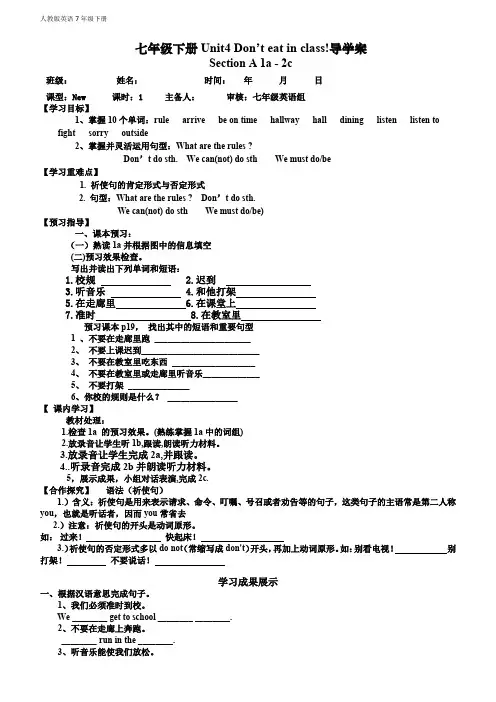
七年级下册Unit4 Don’t eat in class!导学案Section A 1a - 2c班级:姓名:时间:年月日课型:New 课时:1 主备人:审核:七年级英语组【学习目标】1、掌握10个单词:rule arrive be on time hallway hall dining listen listen tofight sorry outside2、掌握并灵活运用句型:What are the rules ?Don’t do sth. We can(not) do sth We must do/be【学习重难点】1. 祈使句的肯定形式与否定形式2. 句型:What are the rules ? Don’t do sth.We can(not) do sth We must do/be)【预习指导】一、课本预习:(一)熟读1a并根据图中的信息填空(二)预习效果检查。
写出并读出下列单词和短语:1.校规2.迟到3.听音乐4.和他打架5.在走廊里6.在课堂上7.准时 8.在教室里预习课本p19,找出其中的短语和重要句型1 、不要在走廊里跑______________________2、不要上课迟到___________________________3、不要在教室里吃东西___________________4、不要在教室里或走廊里听音乐_____________5、不要打架______________6、你校的规则是什么?________________【课内学习】教材处理:1.检查1a 的预习效果。
(熟练掌握1a中的词组)2.放录音让学生听1b,跟读,朗读听力材料。
3.放录音让学生完成2a,并跟读。
4..听录音完成2b并朗读听力材料。
5,展示成果,小组对话表演,完成2c.【合作探究】语法(祈使句)1.)含义:祈使句是用来表示请求、命令、叮嘱、号召或者劝告等的句子,这类句子的主语常是第二人称you,也就是听话者,因而you常省去2.)注意:祈使句的开头是动词原形。
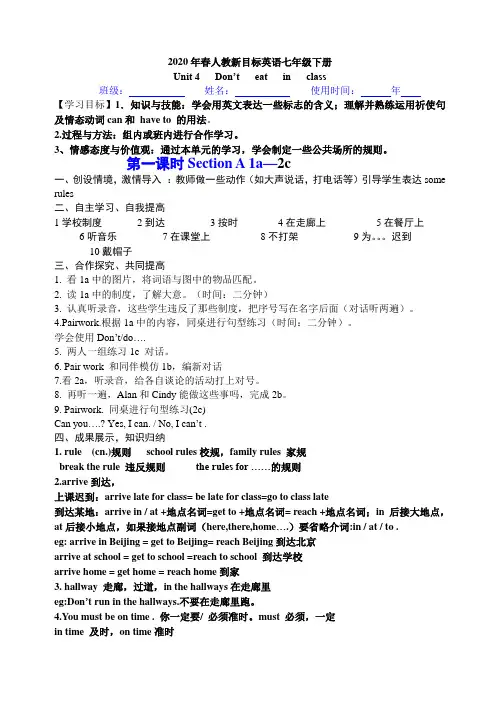
2020年春人教新目标英语七年级下册Unit 4 Don’t eat in class班级:姓名:使用时间:年【学习目标】1.知识与技能:学会用英文表达一些标志的含义;理解并熟练运用祈使句及情态动词can和have to 的用法。
2.过程与方法:组内或班内进行合作学习。
3、情感态度与价值观:通过本单元的学习,学会制定一些公共场所的规则。
第一课时Section A 1a—2c一、创设情境,激情导入:教师做一些动作(如大声说话,打电话等)引导学生表达some rules二、自主学习、自我提高1学校制度_______2到达_________3按时________4在走廊上__________5在餐厅上_____6听音乐_________7在课堂上__________8不打架___________9为。
迟到_______10戴帽子________三、合作探究、共同提高1. 看1a中的图片,将词语与图中的物品匹配。
2. 读1a中的制度,了解大意。
(时间:二分钟)3. 认真听录音,这些学生违反了那些制度,把序号写在名字后面(对话听两遍)。
4.Pairwork.根据1a中的内容,同桌进行句型练习(时间:二分钟)。
学会使用Don’t/do….5. 两人一组练习1c 对话。
6. Pair work 和同伴模仿1b,编新对话7.看2a,听录音,给各自谈论的活动打上对号。
8. 再听一遍,Alan和Cindy能做这些事吗,完成2b。
9. Pairwork. 同桌进行句型练习(2c)Can you….? Yes, I can. / No, I can’t .四、成果展示,知识归纳1. rule (cn.)规则school rules校规,family rules 家规break the rule 违反规则the rules for ……的规则2.arrive到达,上课迟到:arrive late for class= be late for class=go to class late到达某地:arrive in / at +地点名词=get to +地点名词= reach +地点名词;in 后接大地点,at后接小地点,如果接地点副词(here,there,home….)要省略介词:in / at / to .eg: arrive in Beijing = get to Beijing= reach Beijing到达北京arrive at school = get to school =reach to school 到达学校arrive home = get home = reach home到家3. hallway 走廊,过道,in the hallways在走廊里eg:Don’t run in the hallways.不要在走廊里跑。
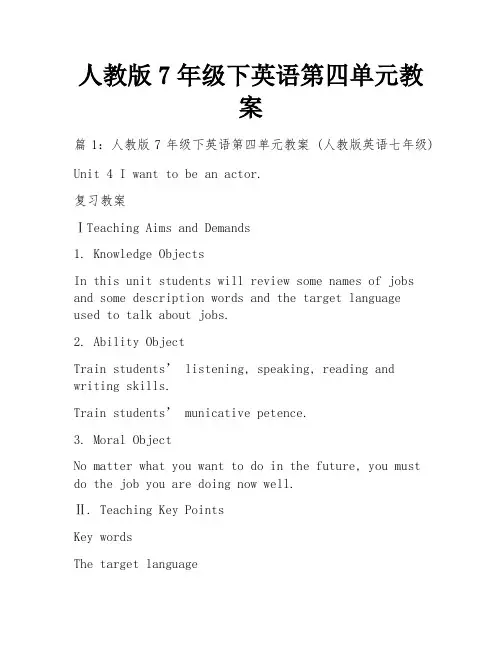
人教版7年级下英语第四单元教案篇1:人教版7年级下英语第四单元教案 (人教版英语七年级) Unit 4 I want to be an actor.复习教案ⅠTeaching Aims and Demands1. Knowledge ObjectsIn this unit students will review some names of jobs and some description words and the target language used to talk about jobs.2. Ability ObjectTrain students’ listening, speaking, reading and writing skills.Train students’ municative petence.3. Moral ObjectNo matter what you want to do in the future, you must do the job you are doing now well.Ⅱ. Teaching Key PointsKey wordsThe target languageReview how to talk about and describe jobs.Review the present tense.Review What and Where questions.Ⅲ. Teaching DifficultiesTrain students’ listening, speaking, reading and writing skills..Review how to read and write a newspaper want ad.Review how to write a letter applying for a job.Ⅳ. Teaching MethodsPairworkPracticing methodsⅤ. Teaching AidsA puterCardsⅥ. Teaching ProceduresStepⅠ ad1. In this activity you’re to write your own newspaper want ad.First you should decide what kind of job you can offer to people.Then consider what you are going to write about.2. Set a time limit of two or three minutes for students to prepare before writing the ad.3. Have students start to write their own newspaper want ads.4. Ask a student to write his or her ad on the blackboard. Correct any language and spelling errors along with the rest students.StepⅡ Pair work-talk about jobsUse these target language to make a conversation with your partner.What does he do?He’s a waiter.What do you want to be?I want to be an actor.Where does she work?She works in a bank.What does he do?He’s a student. He wants to be a doctor.StepⅢ Review the structures1. Review the where and what questions. Write sentences on your exercise book. Write as many as you can.2. Ask several students to read their sentences.StepⅣ Review the key vocabulary1. Give students several minutes to memorize the key vocabulary.Doctor, actor, reporter, police officer, waiter, band, clerk, sales assistant, student, dangerous, fun, exciting, difficult, boring, interesting2. Have a dictation.StepⅤ SummaryIn this class we’ve reviewed all the key words inthis unit .We also reviewed to write a newspaper want ad.StepⅥ HomeworkReview all the key words and language points learned in this unit.Blackboard DesignUnit 4 I want to be an actor.What does he do?He’s a waiter.What do you want to be?I want to be an actor.Where does she work?She works in a bank.教学反思:篇2:人教版七年级上英语第四单元复习资料be动词的种类:be动词包括“am”, “is”, “are”三种形式。
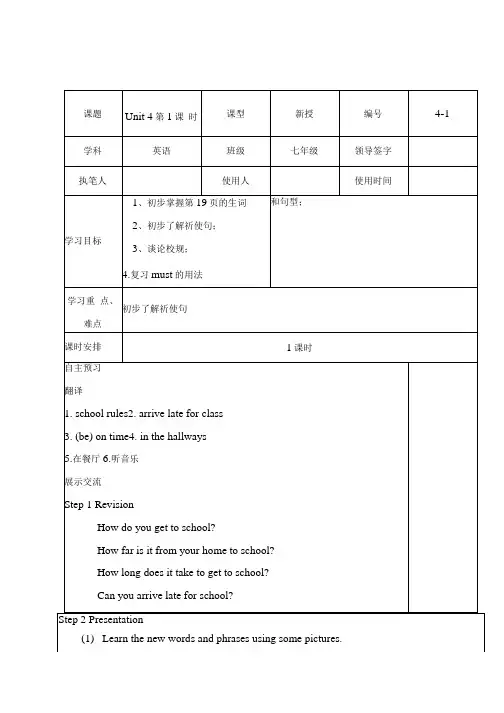
(2)Present key sentences with these pictures.Don't arrive late for class.We must be on time.Don't run in the hallways.Don't cat in the classroom.Don,t listen to music in class. Don't fight.(3)Finish la, and then check the answers.Step 3 ListeningListen and finish lb. Check the answers.Step 4 Pair workTalk about the rules in la.知识探究Don't arrive late for class.不要上课迟到。
(1)本句是一个否认的祈使句,祈使句是以动词原形开头的,表示命令或请求的句子。
其否认句是在动词原形之前加don"。
如:Don't do that again.不要再做那样的事情了。
Don't tell our teachers our secrets.不要告诉我们老师我们的。
(2)肯定的祈使句:①句型:动词原形……(省略主语)。
例如:Look at these holes ! 看这些洞。
②有时,为了加强语气,可以在动词之前加do。
例如:Do be quiet.务必安静。
③用客气的语气表示祈使句时,可在句首或句尾加上please,但如果在句尾加please,那么在please之前一定要加上一个逗号(2)表示允许、许可,“可以”、“能"Can the students run in the hallways?学生们可以在走廊上跑吗?We can eat outside.我们可以在外面吃东西。
Can I come in?我能进来吗?问句中,把can放到主语前面,并且没有人称和数的变化, 巩固提升单项选择()1. —What arc the school rules?—We_ listen to music in class.A. don'tB. can'tC. aren't()2. Don't class.A. be lateB. late forC. be late for()3. There are rules in our school.A. a lots ofB. a lot ofC. lot of选择相应的短语补全对话A: We have a lot of rules in our school.B: [A: Don't eat in the classroom. Don't run in the hallways. Don't listen to music in the classroom.2B:3Read the sentences in Grammar Focus and try to remember them by heart.Step 3 Practice(1)Check the answers in 3a. Read the sentences.(2)Check the answers in 3b. Read the sentences.Step 4 ConsolidationMake up five cool rules for a dream school. Vote for the Cook st School.知识探究What do you have to do ?你们必须做什么?have to与其他情态动词一样后接动词原形,表示客观上的需要,强调被迫性,有“不得不”的含义。
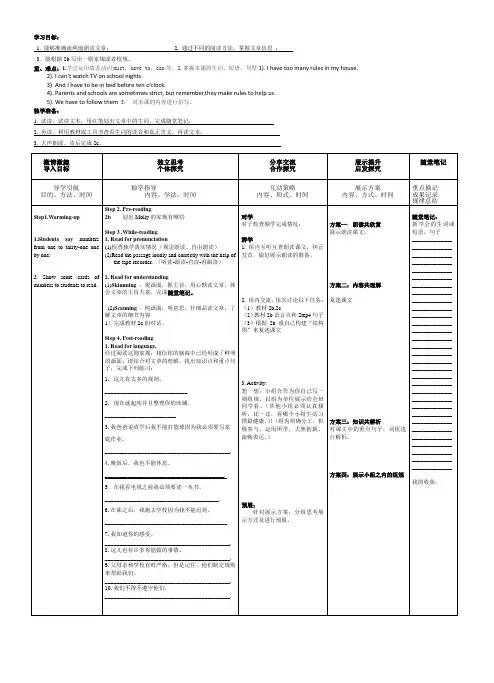
学习目标:1. 能够准确流利地朗读文章;2. 通过不同的阅读方法,掌握文章信息;3.能根据2b写出一则家规或者校规。
重、难点:1.学会运用情态动词must, have to, can等。
2.掌握本课的生词、短语、句型1). I have too many rules in my house.2). I can’t watch TV on school nights.3). And I have to be in bed before t en o’clock.4). Parents and schools are sometimes strict, but remember,they make rules to help us.5). We have to follow them 3. 对本课的内容进行仿写。
独学准备:1. 试读。
试读文本,用红笔划出文章中的生词,完成随堂笔记;2. 再读。
利用教材或工具书查看生词的读音和真正含义,再读文本;3. 大声朗读。
读后完成2c。
当堂测评分层达标基础落实★一.写出下列词组和句子。
1.太多的规定2.不得不3.放学后4.在学校期间的晚上5.整理床铺6.十点之前7.在周末8.打扫房间9.洗衣服10.严格要求某人11.遵守制度能力发展★★二.单项选则( ) 1.I have to get up six the morning.A. at; onB. at; inC. on; inD. on; at ( ) 2.Everyone in our class English very much.A. likeB. likesC. is likeD. liking ( ) 3. On weekends I go to the Children’s Palace the piano.A. to learnB. learnC. learnedD. learns ( ) 4.I have rules in my familyA. too manyB. much tooC. too muchD. many too( ) 5. Did Mary at school late this morning?A. arriveB. getC. arrivedD. go ( ) 6. you pass me the book, please? Yes, I can.A. AreB. DoC. CanD. Does ( ) 7. Don’t too much TV. It’s bad for your eyes.A. watchB. watchedC. watchingD. to watch( ) 8. You go in a hurry(匆忙).There’s enough time left.A. have toB. hadn’tC. don’t have toD. mustn’t( ) 9.Tom fought that boy in a red shirt on the playground just nA. forB. atC. withD. on ( ) 10. –Must I get up early tomorrow? -No, .A. you mustn’tB. I don’t think you have toC. you can’tD. you need三.汉语提示完成句子,每空一词。

七年级下英语Unit4导学案七年级下英语Unit 4. Don’t eat in class.第一课时一、【学习目标】:1 能掌握以下单词:rules, arrive, late, dinning hall, listen to, fight...2. 能用can表示许可的肯定句、否定句、一般疑问句及回答。
3. 能掌握本节课重点句型并用以谈论校园内的规章制度。
【学习重点】:掌握祈使句的用法,并能听懂、会说一些简单的祈使句。
二、【预习内容】:1.自主预习书19-20页,找出下列短语。
1. school rules __________2. arrive late for class __________3. (be) on time __________4. in the hallways __________5. 在餐厅_______________6. 听音乐_______________7. eat outside ____________8. wear a hat _____________9. a lot of _______________ 10. be late for class____________ 11. 不得不___________12. 穿校服_______________ 13. 保持安静________________2. 模仿下列句型给你们班制定班规。
Don’t eat in the classroom. Don’t play basketball in the classroom.________________________________________________________________ ____________________________________________________________________ ________________________________________________________________________________________________________________________________________ ____三、【学习过程】:1.预习情况检查交流。
Unit 4Where’s my schoolbag?Period 3 (Section B 1a–1e) 【教学目标】●知识目标1. Master the new words and useful expressions.2. Master the target language.●能力目标1. Be able to talk about where things are.2. Develop students’ speaking and writing skills.●情感目标Try to educate students to form good living habits.【教学重难点】●重点1. Master the new words and useful expressions.Words: radio, clock, tape, player, model, planePhrases: tape player, model plane2.Master the target language:①—Where’s …? —It’s in/on/under …②—Where are …? —They’re in/on/under …3. Be able to talk about where things are.4. Improve students’ speaking and writing skills.●难点1. Improve students’ speaking and writing skills.2. The usage of target language.【教学准备】A tape recorder, some pictures and handouts.【教学方法】任务型教学法、情景交际法、自主学习与合作学习相结合【课时安排】One period【教学过程】Step 1: Greetings and revision1. Greeting the Ss. Check the homework.2. Review what we’ve learned in Section A.(1)T: I will show you some pictures. Please answer my questions by looking at them.Questions: ①Where is the baseball?②Where are the books?③Where is the schoolbag?④Is the pen on the table?⑤Are the keys under the sofa?(2)T: I would like some of you to ask the questions and others answer according to the pictures.…Step 2: Lead-inTeach the new words, show the students the pictures of the following objects (radio, clock, tape player, model plane, tape, hat) and ask and answer like this:(point to the clock)T: What’s this?Ss: It’s a clock.T: How do you spell it?Ss: C-L-O-C-K, clock.T: Yes, thank you.Show some other things, and have students work in pairs to make conversations like this....Step 3: Presentation1. Teach activity 1a(1) Look and look upT: Open your books to page 22. Would you please look at activity 1a? There are some words in the box. Do you know what they mean? Please look them up in the word list on page 90 and then write down the Chinese meanings under each word. Now, I am sure you know what they mean.(2) MatchT: Please match the words with the things in the picture.(3) Check the answersT: Finished, everyone? Let’s check the answers now.Answers: 1.a 2.f 3.d 4.e 5.b 6.c(4) Read. First, ask the students to read the words after the teacher then ask them to read the words one by one.2. Teach activity 1b(1) Look and rememberT: Look at the picture in 1a for three minutes and try to remember the things in it as much as possible.(2) WriteT: Write down the things you remember and where they are in your notebooks.(3) ReadT: Look at your notebooks and read what you wrote down.Step 4:Practice1. Teach activities1c(1) T: Listen to the conversation. Pay special attention to the names of objects. You will hear some of the things Tom wants from his room, not all of them. Circle each item which is mentioned in the conversations.(2) Play the recording for the first time. Ask students to listen carefully and circle the items.(3) Play the recording for the second time. Ask them to check the answers themselves.(4) Collect the answers and correct mistakes with the class.2. Teach activity 1d(1) Play the tape again, ask students to listen carefully and write down where Tom’s things are.(2) Ask them to pay attention to the pronunciation and intonation.(3) Invite some students to present their work.Step 5: ConsolidationTeach activity 1e(1) Ask students to read through the instruction so that they will know the meaning of it.(2) Follow the instruction. Ask students to make conversations using the school things in Tom’s room in pairs.(3) Leave the students several minutes to do this task.(4) Move around the room, offering help as needed.(5) Invite some pairs to act out their conversations for the whole class.【课堂小结】In this period, we’ve mainly leaned some words of the objects. And we’ve also improved our listening and writing skills through the practice.【课后作业】1. Practice the target language.2. Copy the mains words and try to recite them.3. Preview the next period.。
班级:姓名:日期:主备人:白晶备课组长:蹲点领导(签字):课题:Unit 4 Don’t eat in class!(1a-2d) 课型:听说课课时: 1课时学习目标:1、掌握新单词 2、掌握并灵活运用句型:What are the rules ?Don’t do sth. We can (not) do sth. We must do/be重、难点:1.祈使句的肯定形式与否定形式。
2、.句型:What are the rules ?Don’t do sth. We can (not) do sth. We must do/be 3、提高学生的听说能力。
独学准备:1. 学习本节课的新单词(完成随堂笔记一)Step1 Warm-up andlead-inGreet the students. T: Good morning/ afternoon.S: Good morning/ afternoon..T: What can you do in the classroom? What can’t you do?S: I can…/ I can’t…内容:1.本节课单词的读音和意思2.主句型学法:Step2 1aWrite the number of the rule next to the student .Step3 1b1.Listen and finish the task2.Read the conversation by themselves。
Step 4 2a/2b1.before listening: 大声朗读P32—2a中的单词,让学生先认真听,然后模仿重复两遍。
2.while listening:a.listen and check the activities Alan and Cindy talk aboutb.listen again and circle the words they hear对学1.1a 对子检查1a独学完成情况。
人教版新目标七年级英语下册Unit 4 导学案课题:Unit 4 A1 课型:New 课时数:2课时班级: 姓名:【教学目标】Talk about rules ;Do things on time【德育目标】Unite with your classmates and be ready to help others【重点难点】Imperative Sentences ; Talk about rules and make rules.【教学过程】二次备课预习指导:I. 默写下列单词1.规则________2.到达_________3.准时___________4.走廊_________5.大厅______6.餐厅_________7.听_______8.听…_________9.打架_______10.抱歉的_________ 11.在外面______12.穿________ 13.重要的__________14.带来________15.校服__________ 16.安静的________II. 预习课本P19 1a-P20 2c页,翻译下列词组和句子1.校规__________________2.上课迟到_______________________3.准时_________________4.在走廊跑_________________________5.在餐厅吃__________________6.在课堂上听音乐___________________7.别打架.____________________ 8.在外面吃___________________9.戴顶帽子____________ 10.不要上课迟到。
你必须准时。
_________________________________________________________.11.不要在走廊里跑。
__________________________________________12.不要在教室里吃东西。
Unit4 Don’t eat in class.第二课时Section A (Grammar Focus-3c )学习目标:1、重点单词rule规则2、重点词组wear a hat戴帽子wear a uniform穿校服be quiet保持安静3、重点句式(1)Don’t run in the hallways. 不要在走廊里跑。
(2)---What are the rules? 规则是什么?---We must be on time for class. 我们必须准时上课。
(3)---Can we eat in the classroom? 我们能在教室里吃东西吗?---No, we can’t, but we can eat in the dining hall. 不能,但是我们可以在餐厅里吃东西。
(4)---Does he have to wear a uniform at school? 他在学校必须穿校服吗?---Yes, he does./ No, he doesn’t. 是的。
/ 不,不是。
(5)---What do you have to do? 你必须做什么?---We have to be quiet in the library. 我们在图书馆必须保持安静。
重点难点:1. 祈使句的使用2. 情态动词的使用导学设计:1. Don’t run in the hallways. 不要在走廊里跑。
【归纳】祈使句是用来表示请求、命令、叮嘱、号召或者劝告等的句子, 这类句子的主语常是第二人称you,也就是听话者,因而you常省去了。
祈使句的开头是动词原形。
可在句首或句末加上please,若在句末加please,之前要用逗号隔开。
祈使句有肯定祈使句与否定祈使句两种。
祈使句的否定形式多以do not (常缩写成don’t) 开头, 再加上。
Listen to music outside.Don’t listen to music outside.(1)肯定祈使句的常见句型结构:①Do型:动词原形+宾语+其他. 如:Open the door, please.②Be型:Be+表语. 如:Be a good boy!③Let型:Let+宾语+动词原形+其他.(或:Let’s+动词原形+其他.) 如:Let me help you.又如:Let’s play tennis.(2)否定祈使句的常见句型结构:①Do型和Be型的否定式:Don’t+动词原形/ be+其他. 如:Don’t forget me. 又如:Don’t be late.②Let型的否定式:Don’t+ let+宾语+动词原形+其他. (或:Let’s+ not+动词原形+其他.) 如:Don’t let him go back. 又如:Let’s not go swimming.③警示语:No+名词/ 动词-ing形式. 如:No talking.2.We must be on time for class.我们必须准时上课。
新人教版七年级英语下册第四单元导学案【课题】Unit 4 Don’t eat in class【学习目标】:1.学习识记本单元中的重点词组及单词。
2.初步理解本单元中重点单词及词组的用法。
【要点和难点】理解掌握重点单词及词组的用法。
【导学指导】(一)自主学习写出并读出下列单词和短语:校规迟到听音乐重要的in the hallway Don’t fight. listen to music arrive late for class外出______________清洗餐具____________ 铺床_______________(对某人)要求严格___________________ 遵守规则_____________________到达_________ 准时____________餐厅_________________(二). 合作探究1. arrivev. 到达。
是不及物动词,常用的短语为“arrive at +小地点”和“arrive in +大地点”;arrive 后如果加副词,at/ in 省略。
get to +地点指到达某地,to 后如果接副词,则to 省略。
reach 意为“到达”可直接跟宾语。
例1)I am always the first to ________ _________ the school.2) They usually ________the school at five o’clock.2. listen v. 听,倾听,指听的动作,为不及物动词,可以单独使用,但其后如接宾语则加介词tohear 表示听到,是指听得结果例2. __________! Can you ________ anything? 听!你能听到什么?3. fight v. n. 打架;战斗。
相关短语:fight about fight with fight againstfight about 意为“为…..而战”“就….争吵”该短语后接名词代词或宾语从句,表示吵架的原因。
fight with 意为“与…..作战;与….打架”, with 后接表示人的名词或代词做宾语。
fight against 意为“抵抗…..;对抗……”例3. We often _________ __________ who plays with the doll first. 我们常为谁先玩玩具娃娃而争吵。
Don’t ________ ________ your classmates. 不要和你的同学吵架。
_________ __________ poverty 与贫困作斗争。
4. put on; wear; in; dressput on 指穿上,戴上,强调穿衣的动作,其反义词组是take off, 后接代词it/ them 时,代词需放在词组中间。
wear 指穿着,戴着。
强调穿衣的状态。
in 指穿着,戴着,后接表示颜色衣服的词,相当于wearing.dress 指穿衣服,表示动作,dress sb 给某人穿衣服,dress 做不及物动词时,表示“穿好衣服。
例4 Please ____________ __________ your coat. 请穿上你的外套。
He _________glasses. 他戴着眼镜。
The boy ______ red coat is my brother. 穿红色外套的男孩是我的弟弟。
Get up and __________ quickly. 起来快穿好衣服。
【课堂练习】(一) 基础达标A) 根据句意及首字母提示完成单词。
1. Don’t break r______in the school library.2. Nick is very friendly to everyone. He never f_______.3. It’s time for lunch. Let’s go to the d_______ hall.4. Don’t run in the h_______. It’s a little dangerous.5. We often have our PE class in the g when it rains.6. Every Sunday our mother w__________ the clothes of all the family.8. Don’t stay o___________. It’s too cold. Come in!9. Dogs like to bark(吠叫) ____________(大声的)if there is a stranger(陌生人).10. They came back from Beijing two days l .(二)巩固提升B) 用所给单词的适当形式完成句子。
1. Can those students _______ (have) lunch at home?2. Look at the sign(标志) on the wall! It says “No _________ (swim)!”3. __________ (do) your homework and don’t watch TV.4. Boys and girls all need to wear sports ________(shoe) for gym class.5. On (child) Day, we played a lot of games and (have) much fun.6. Please practice (play) the guitar every day.7. I’m so tired. Let’s stop (write) and take a rest.8. He (find) boy (cry)last Sunday.9. Don’t talk ____________(loud) in the meeting room【课题】Unit 4 Don’t eat in class【学习目标】:1. 学习section B 部分的课文。
2. 理解课文中信件的内容。
3. 学会写有关规则的文章及复习如何写一封信。
【要点和难点】学会写有关规则的文章及复习如何写一封信。
【导学指导】(一)自主学习预习课文,用 have to, must 及can 和can’t 填空。
1.Molly ______________ play basketball on school days, but she __________ playit on weekends.2.Molly ___________ do her homework first when she gets home.3.Molly __________ read a book after dinner before she ___________ watch TV.4.At school, Molly ____________ be noisy or eat in class.5.Parents and schools make rules to help students. So students___________ followthe rules.(二). 合作探究1. There are too many rules! 有太多的规定。
too many 意为太多的。
其中心词是many,too 修饰many 以加强语气,too many用来修饰可数名词复数。
too much意为太多的。
其中心词是much,too 修饰much 以加强语气,too much用来修饰不可数名词。
much too 意为非常,太。
是副词性短语,中心词是too, much 修饰too 以加强语气。
much too 用以修饰形容词或副词。
例1. I have ________ __________questions to ask.There is _________ __________ rain in the south.This dress is _________ _________ expensive.2. At school, we have more rules…在学校,我们有更多的规定….more 在此是many 的比较级,意为更多的。
它还有“又,再,别的,额外的”意思,常放在some, a little, a few, a lot 以及数词的后面。
“名词+more”表示“再来….”。
例2. I want to stay here for five___________ days. 翻译:____________________________Please give her some ____________. 翻译:________________________________.3. Parents and schools are sometimes strict…父母和学校有时是严格的…sometimes 是副词,意为有时,相当于 at times, 一般位于系动词,助动词,情态动词之后,实义动词之前,也可放于句首。
some times 意为几次,几倍。
some time 意为一段时间。
例3. ____________ she is happy ; ___________ is sad.I have been to Beijing ________ ___________.Don’t worry! There is _______ _______ left.4. …, and I have to keep my hair short…., 而且我必须留短发。
keep 意为保持,后接形容词,“ keep + 名词+ 形容词”指“保持某种状态”。
keep + 宾语+ v. ing 指“使…保持某种状态”。
keep doing sth 或keep on doing sth 继续(一直,老是,反复)做某事。
例4. I’m sorry to ________ you waiting.They decided to ________ trying.【课堂练习】(一) 基础达标1.-Why are you walking so fast? Because I get home to do my work.A. haveB. go toC. have toD. has to2. You go in a hurry(匆忙).There’s enough t ime left.A. have toB. hadn’tC. don’t have toD. mustn’t3.Sorry, I can’t it in English. I can only Chinese.A. speak, talkB. say, tellC. say, speakD. talk, say4.-Can you cook dinner? . It’s easy.A. No, I can’tB. Yes, I canC. No, I canD. Yes, I need(二)巩固提升根据句意及首字母提示补全单词1.My mother asked me to do the d_________ after dinner yesterday evening.2.We can’t go out on school n___________.3.We must go to bed b_________ ten o’clock in the evening.4.It’s n_________ in the classroom. Please don’t talk.5.The students should do some r_______ in the morning.6.My parents are s_________ with me.7.We must f__________ these rules.8.R__________ to wait for me at the school gate tomorrow morning.【课题】Unit 4 Don’t eat in class【学习目标】:1. 复习本单元的重点词汇及短语。